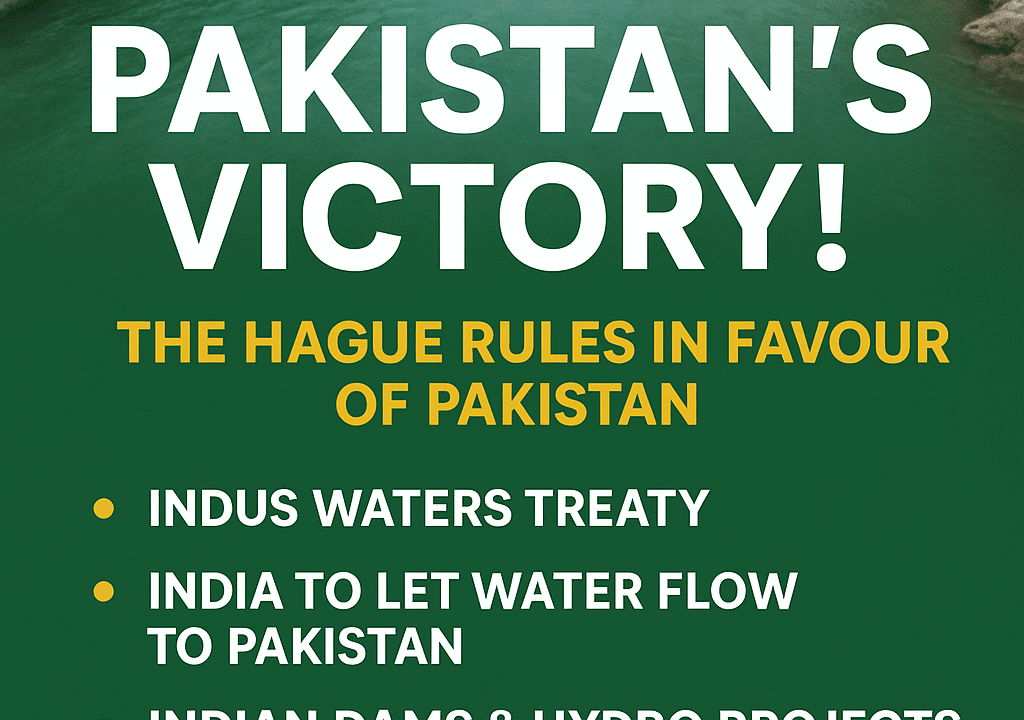

Court of Arbitration Rules on General Interpretation of the Indus Waters Treaty The Hague – August 08, 2025 — The Court of Arbitration empaneled under the Indus Waters Treaty (IWT) of 1960 has delivered a landmark Award on August 8, 2025, in a case brought by the Islamic Republic of Pakistan against the Republic of India. The ruling provides critical clarity on the interpretation and application of the Treaty’s provisions concerning India’s construction of run-of-river hydroelectric plants on the Western Rivers — the Indus, Jhelum, and Chenab.
Read the Press Release the permanent Court of Arbitration August 08,2025
Indus Water Treaty 1960 Signed by Pakistan & India
Background of the Case
Pakistan initiated the arbitration in 2016 under Article IX and Annexure G of the Treaty, objecting to certain design elements of India’s proposed hydroelectric projects. Pakistan argued that these designs could adversely affect its downstream water rights.
India, however, chose not to participate in the arbitration and repeatedly challenged the Court’s competence. Despite these objections, the Court:
- 6 July 2023: Issued an Award on Competence, unanimously confirming its authority to hear the case.
- 27 June 2025: Issued a Supplemental Award, ruling that India’s unilateral April 2025 announcement to “hold the Treaty in abeyance” had no effect on the Court’s jurisdiction.
Throughout the process, the Court ensured India was informed at every stage and left the door open for its participation. It also scrutinized Pakistan’s claims rigorously — requesting historical evidence, questioning Pakistan’s submissions, and consulting publicly available materials and past jurisprudence.
Key Findings of the Award (8 August 2025)
- Binding Nature of Arbitration Awards
- Awards of a Court of Arbitration are final and binding on both parties.
- Such awards have controlling legal effect over future decisions by neutral experts, other arbitration courts, and even the same court in subsequent disputes.
- Interpretation of Article III & Annexure D
- India is obliged to “let flow” the waters of the Western Rivers for Pakistan’s unrestricted use, except in very limited cases defined in the Treaty.
- Exceptions — such as hydroelectric generation — must be strictly construed and comply fully with the technical limits outlined in the IWT, rather than India’s own “best practices” standards.
- Design Restrictions for Indian Projects
- Specific parameters for low-level outlets, gated spillways, turbine intakes, pondage, and freeboard must be observed to protect Pakistan’s water rights.
- No Effect of India’s Non-Participation
- India’s refusal to participate does not undermine the Court’s authority or the binding nature of its decisions.
Why This Matters for Pakistan
This Award strengthens Pakistan’s position in safeguarding its water security and ensures that the IWT — one of the most resilient international water-sharing agreements — continues to function according to its original intent.
It also demonstrates that international legal forums remain effective in resolving disputes when direct bilateral talks fail. For Pakistan, this ruling is not just about water — it’s about asserting treaty rights, protecting agriculture, and securing the livelihoods of millions.
Written by: Waseem Khan – Ghandhara Estate
#Induswatertreaty #PakistanIndia #WaterRights #CourtOfArbitration #IWT #PermanentCourtOfArbitration #IndusJhelumChenab #InternationalLaw #PakistanVictory #WaterSecurity
